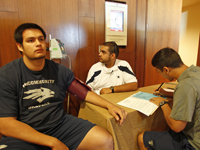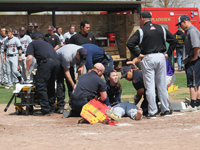They've Got Your Back: A Salute to Athletic Trainers

Simpson is an assistant athletic trainer with the Texas Tech University baseball team.
Bryan Simpson, MAT, ATC, LAT
Q: Where/when did you receive your athletic training degree?
A: Texas Tech University Health Sciences Center, 2006
Q: Why did you decide to pursue a career in athletic training?
A: I enjoy knowing and working with student athletes on a personal level and the competitive nature of athletics.
Q: What is the best part about your job?
A: Building personal relationships with athletes and seeing an athlete return to a high level of play after an injury.
Q: What is your favorite sport and why?
A: Baseball No other sport parallels life more, the game teaches you how to deal with success and failure every single day.
Q: If you’re a TTUHSC alumnus, what is your fondest memory of your time at the university?
A: When the girl in gross anatomy passed out on the first day of class.
Q: What has been your most memorable experience on the job?
A: Playing at Minute Maid Park.
Q: The theme for this year’s National Athletic Training Month is “We’ve Got Your Back.” How do you practice this philosophy in your career?
A: As an athletic trainer I always have the athlete’s best interest in mind.
Q: What is one piece of advice you’d give to someone considering a career in athletic training?
A: Network with others in the field and never burn bridges.

Reyes (center) is a second-year Masters of Athletic Training Student in the School of Allied Health Sciences.
Andy Reyes, EMT-B, LAT
Q: Where/when did you receive your AT degree?
A: I will graduate in May 2014 with my master's in athletic training. I graduated from Texas Tech in 2011 with a B.S. in exercise sports science.
Q: Why did you decide to pursue a career in athletic training?
A: I enjoy helping people. I wasn’t good enough to play sports, but I enjoy being a part of competitive athletics. Helping someone who is competitive and has a drive get back on the field is what drew me to the profession.
Q: What is the best part about your job?
A: Building personal relationships with athletes, and seeing athletes succeed after a serious injury.
Q: What is your favorite sport and why?
A: Baseball — It’s America’s past time.
Q: What is your fondest memory of your time at the university?
A: Working the Buffalo Spring Lake Triathlon, getting the opportunity to work hand in hand with doctors, nurses and paramedics.
Q: The theme for this year’s National Athletic Training Month is “We’ve Got Your Back.” How do you practice this philosophy in your career?
A: Athletic trainers are advocates for athlete’s health and safety, while helping them to participate at their highest potential.

Taylor is the director and an associate professor in the Master of Athletic Training Program.
LesLee Taylor, Ph.D., LAT, ATC
Q: Where/when did you receive your AT degree?
A: I completed my education before a degree in athletic training was required to sit for the Board of Certification Inc. certification exam. I have a bachelor’s degree from the University of Kansas (KU) in exercise science, a master’s degree from the University of Arizona in kinesiology/athletic training and a Ph.D. from Texas Tech in family and consumer science education (adult education). I received my early athletic training experience as a student athletic trainer at the University of Kansas before becoming certified and worked as a graduate assistant at the University of Arizona before landing my first job at Texas Tech.
Q: Why did you decide to pursue a career in athletic training?
A: I didn’t like organic chemistry. Actually, I grew up in a very small town in Kansas and did not know about athletic training as a career option. A friend at KU was a student athletic trainer and when I decided I wanted to change my major, she suggested I contact Lynn Bott, the head athletic trainer at KU. I fell in love with it and was a student athletic trainer for three years at KU.
Q: What is the best part about your job?
A: As a clinician I love working with the athletes, seeing how they progress and return to play; as an educator I love watching my students develop into clinicians and knowing that they are impacting the future of the profession. Both roles are extremely rewarding for me and come down to forming relationships with others.
Q: What is your favorite sport and why?
A: College basketball! (It is March Madness, my favorite time of year). I worked with men’s and women’s basketball at KU, women’s basketball at the University of Arizona and then a job with Lady Raider Basketball is what brought me to Lubbock in 1995.
Q: What has been your most memorable experience on the job?
A: I have been blessed to work amazing teams and people as a clinician and educator. When I walk into the United Spirit Arena at Texas Tech it is wonderful to see 10 banners that hang in the rafters from Lady Raider teams I worked with. I enjoy seeing athletes I’ve worked with succeed in their respective professional sports, the Olympics, etc. and former students accomplishing amazing things in their career. However, I will never forget the simple words a small town West Texas high school football player said to me at the hospital after being unresponsive on the field ... "Yes, ma’am. Thank you.”
Q: The theme for this year’s National Athletic Training Month is “We’ve Got Your Back.” How do you practice this philosophy in your career?
A: I think it is important to be involved in our profession and to support our colleagues and patients.
Q: What is one piece of advice you’d give to someone considering a career in athletic training?
A: Build relationships, make connections, network and don’t forget that actions speak louder than words. What we do as athletic trainers reflects on us as individuals, health care providers and the profession.

Andersen is an assistant athletic trainer at Wayland Baptist University.
Erica Andersen, MAT, ATC, LAT
Q: Where/when did you receive your AT degree?
A: Bachelors in Kinesiology, 2010, University of Virginia; Master in Athletic Training, 2012, TTUHSC
Q: What is the best part about your job?
A: Working with athletes, seeing them grow and succeed, not just with injuries, but also within their sports and in the classroom.
Q: What is your favorite sport and why?
A: Baseball, I’ve worked the most with baseball teams. I love how intricate the game is, but also how intricate injuries are (like how an ingrown toenail can affect the shoulder, or how dropping your elbow an inch can cause major problems while pitching, etc.)
Q: If you’re a TTUHSC alumnus, what is your fondest memory of your time at the university?
A: No specific memory, but just meeting my class and being able to call them friends and colleagues. Spending countless hours in the lab and library with them and laughing at way too many things.
Q: What has been your most memorable experience on the job?
A: Wow, take your pick! Almost every day I laugh so hard I nearly cry. I think I work with some of the best athletes, personality-wise. From an athletic training standpoint, it would probably be the first time I spineboarded and I was at the head, hearing the EMT say “OK, you’re in charge, what do you want us to do,” was one of the proudest moments of my life.
Q: The theme for this year’s National Athletic Training Month is “We’ve Got Your Back.” How do you practice this philosophy in your career?
A: Both literally and figuratively, I have spineboarded five athletes over the past two years, so I definitely have “my athletes’ backs,” but more than that, I am here every day, I listen to their complaints, both athletically and injury-wise, but also hear their personal problems with classes, families, girlfriends, etc. I hear their good news and bad news and in the process have earned their trust.
Q: What is one piece of advice you’d give to someone considering a career in athletic training?
A: Make sure you are willing to put in the time to build your career and willing to put in the time and effort each day at work. Simply showing up is not enough in this career, you really have to care and be willing to work with your athletes.
Related Stories
Celebrating Veterans: TTUHSC’s General Martin Clay’s Legacy of Service and Leadership
From his initial enlistment in the Army National Guard 36 years ago to his leadership in military and civilian health care management roles, Major General Martin Clay’s career has been shaped by adaptability, mission focus and service to others.
Texas Tech University Health Sciences Center School of Nursing Named Best Accelerated Bachelor of Science in Nursing Program in Texas
The TTUHSC School of Nursing Accelerated Bachelor of Science in Nursing (BSN) program has been ranked the No. 1 accelerated nursing program in Texas by RegisteredNursing.org.
TTUHSC Names New Regional Dean for the School of Nursing
Louise Rice, DNP, RN, has been named regional dean of the TTUHSC School of Nursing on the Amarillo campus.
Recent Stories
National Academy of Inventors Names TTUHSC Faculty Senior Members
The National Academy of Inventors (NAI) has designated two current and one former TTUHSC faculty researchers as Senior Members.
The John Wayne Cancer Foundation Surgical Oncology Fellowship Program at Texas Tech University Health Sciences Center Announced
TTUHSC is collaborating with the John Wayne Cancer Foundation and has established the Big Cure Endowment, which supports the university’s efforts to reduce cancer incidence and increase survivability of people in rural and underserved areas.
TTUHSC Receives $1 Million Gift from Amarillo National Bank to Expand and Enhance Pediatric Care in the Panhandle
TTUHSC School of Medicine leaders accepted a $1 million philanthropic gift from Amarillo National Bank on Tuesday (Feb. 10), marking a transformational investment in pediatric care for the Texas Panhandle.
